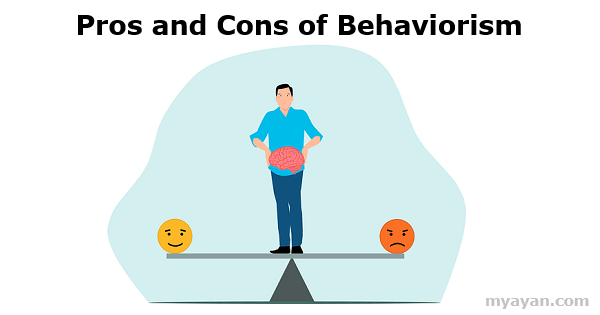If you are into learning psychology, you must have come across the term behaviorism. It is one of the most popularly discussed approaches to understanding behavior. With roots tracing back to 1912, this school of thought has become integral to many forms of psychology today. As much as Behaviorism advances our understanding of behavior, it also raises questions about its ethical implications and limitations. The intent of this guide is to explore both the pros and cons of behaviorism so you can grasp this complex sector of psychology.
Behaviorism is a branch of psychology that focuses on studying observable behavior. It was developed in the early 20th century by Russian physiologist and psychologist Ivan Pavlov, American philosopher John B. Watson, and American psychologist B. F. Skinner, among others. Behaviorism seeks to explain how organisms learn by creating an environment with particular stimuli and responses.
Behaviorism is based on the idea that behavior can be studied and understood without considering internal mental states such as thoughts, feelings, emotions, and motivations. Instead, behavior is seen as a product of external environmental influences. Behaviorists believe that all behaviors are either learned through conditioning or innate.
In classical conditioning, also known as Pavlovian conditioning, an organism learns to associate a stimulus with a response. Pavlov demonstrated this by pairing the sound of a bell with food to make a dog salivate. In operant conditioning, also known as Skinnerian conditioning, behaviors are learned through reinforcement or punishment. Positive reinforcement is when behavior is rewarded, and negative reinforcement is when behavior is punished.
Most major pros of Behaviorism include:
One of the strengths of behaviorism is that it relies on observable and measurable behavior changes. This makes it easier for researchers to collect and analyze data, leading to empirical evidence that supports valid conclusions.
Precision is one of the main advantages of behaviorism, as it enables researchers to accurately observe, record, and measure a person's behavior. Its focus on specific behaviors allows for greater accuracy than other approaches that consider internal mental processes. Researchers can use this data to gain valuable insight into human behavior and determine how intervention or treatment can improve it.
Behaviorism allows researchers to predict how an individual will react to certain stimuli. This is possible because Behaviorism assumes that some external stimulus or conditioning causes all behavior. So if certain stimuli are provided consistently, then a predictable response can be expected from the individual.
Behaviorism is a psychological approach that focuses on the study of behavior. One of its main advantages is flexibility; it can be used in many different areas, from education to psychology to marketing. For example, behaviorism has been used to develop educational practices such as operant conditioning – a system of rewards and punishments designed to shape desired behaviors.
Behaviorism is also known for its emphasis on control. This can help individuals and groups to gain a better understanding of behavior that may be difficult to observe in the natural environment.
People often argue about the cons of behaviorism theory; these include:
The behaviorism approach does not focus on mental processes, such as thoughts, emotions, and feelings. According to behaviorism, these processes are irrelevant, as the only aspect that matters is what is observable.
The behaviorist approach heavily relies on generalizations. It does not consider individuals' unique characteristics, which might affect how they respond to reinforcement or punishment.
The environment plays an essential role in shaping behavior, but biological factors such as genetics and hormones can also play a role. The behaviorist approach sometimes needs to pay more attention to the impact of biology on behavior, leading to incomplete conclusions.
Behaviorism is often criticized for its widespread use of animal experimentation, which raises ethical concerns. The heavy reliance on reinforcement and punishment may be viewed as unethical in some contexts.
Behaviorism has been known to overlook certain behaviors that cannot be explained by its principles, such as creativity and insight. This is because Behaviorism is focused on observable behavior rather than internal thought processes.
Conclusion on Pros and Cons of Behaviorism
Behaviorism has the potential to be a beneficial form of study, as it can uncover helpful knowledge and help better understand the workings of behavior.
However, the reductionist viewpoint associated with this study can be unproductive in exploring deeper questions about mental processes.
It is also worth recognizing that some learning styles do not fit into the traditional paradigms given by Behaviorism and that further research must be done before deciding its effectiveness.
To truly understand this material well, it is worth understanding both an impartial viewpoint on the pros and cons of Behaviorism and a more holistic point of view when looking at how things are learned. By exploring both sides and forming an opinion based on research-backed facts, you can come to your conclusions about Behavioral theory.

It dismisses humanism by asserting that humans are no different from other animals. Furthermore, it fails to acknowledge the influence of free will and the profound impact of memory and beliefs.
Behavioral psychology's remarkable strength is its ability to observe and measure behaviors keenly. Given that behaviorism hinges upon observable actions, conducting research becomes more manageable, facilitating the quantification and collection of data.
One of the most prevalent criticisms of behaviorism is that it is seen as mechanistic and reductionistic. Critics argue that this is self-evident, while behaviorists find it baseless. The question arises: can we uncover the key to understanding these diverging perspectives?
In this rendition of history, behaviorism in the 1970s and 1980s encountered a flaw – it became excessively fixated on narrow issues, losing sight of the broader perspective. Behaviorism also suffered a setback as many psychologists, particularly those in the cognitive field, disregarded the significance of the organism's learning history.
Behaviorism is strongly supported by the notion that behaviors serve as evidence to determine an organism's mental state. This argument highlights the correlation between actions and understanding an individual's mindset, emphasizing the significance of observable behaviors in assessing one's state of mind.